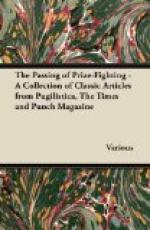* * * * *
“Rather an anti-climax,” I thought when I opened The Happy Foreigner (HEINEMANN) and found that it purported to tell the experiences of an English chauffeuse in France after the Armistice; but I know now that, in any place where ENID BAGNOLD happened to be, there would not be any anti-climax about. In a style so daring and vivid that it could only have been born, I suppose, of fast driving, the authoress describes a romantic affair with a young French officer; but her real theme is the suffering of France bowed down under the intolerable burden of so many strangers, both enemies and friends. The rich and well-fed Americans who will not trouble to understand, the grotesque Chinamen and Annamites, the starving Russians liberated from the Germans, flash by, with the ruins of villages, the tangle of wire and litter of derelict guns; and even the romance, intensely felt though it is, must be fleeting, like the rest of the nightmare, because the Frenchman’s eyes are set on the future and the rebuilding of his fortunes. This book is not “about the War,” but all the same it is one of the best books about the War that I have read.
* * * * *
From a Common Room Window (OWEN) will be a slight refreshment to those who are weary of realistic studies of schoolmasters and schoolboys. “ORBILIUS,” during what I take to have been a long career as a teacher, has not allowed his sense of humour to wither within him. In a note to his slender volume of sketches he says, “School-life is largely a comedy. When a schoolmaster ceases to recognise this it is time for him to ‘bundle and go.’” He has been in the main a keen and sympathetic observer, and though his remarks upon headmasters are a little severe—personally I should hate to be called “a meticulous pedagogue”—I do not think that a little criticism of these potentates will do them the smallest harm. In “The Castigator” “ORBILIUS” gives a laughable sketch. The inventor of a flogging machine is soundly beaten by his own instrument, and he would be a sombre man indeed who could read it without a desire to witness such a chastening performance. By no means the least merit of this book is that it contains no new theories about education.
* * * * *



